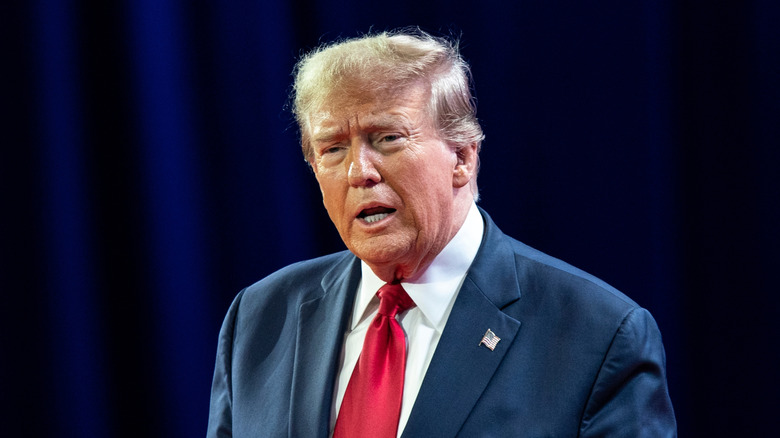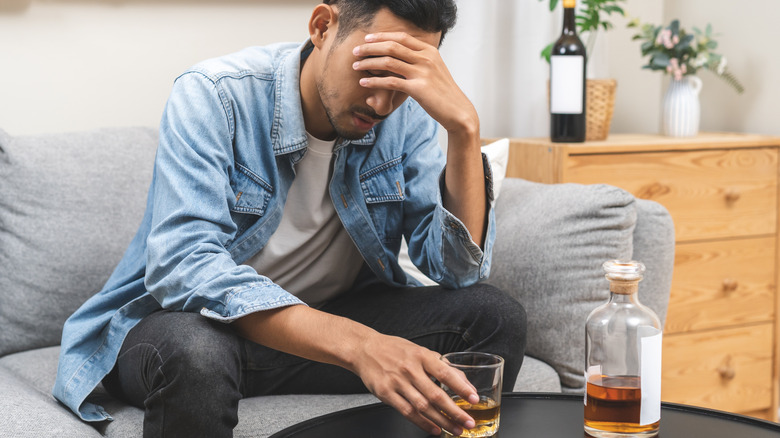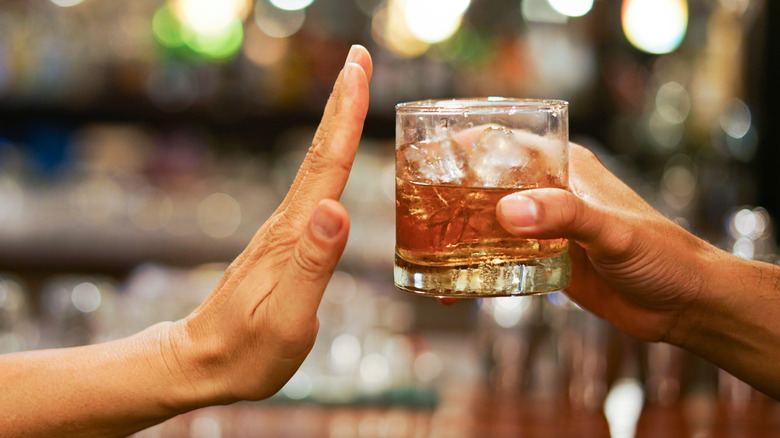Donald Trump's Reason For Not Drinking Alcohol Has Scientific Backing
While Donald Trump is known for not having the healthiest lifestyle — he's probably the biggest fast food fan on the planet, after all — not all his choices are bad. In fact, despite his often-erratic behavior that might suggest otherwise, it turns out that Trump doesn't drink — like, at all or ever. Trump is actually an avowed teetotaler and has been his entire life.
"I had a brother who was a great guy, but he had an alcohol problem," Trump told the National Faith Advisory Board at the Inaugural National Faith Summit in Powder Springs in October 2024, per The Independent. "It's a hard problem to cure and I've never had a glass because of him... I think I have the type of personality where I probably would have a problem." Fred Trump, Jr., who was eight years older than Trump, was only 42 when he passed away from an alcohol-related heart attack.
Not only did Trump witness the effect that alcohol had on this brother from a young age and how it led to his ultimate demise, but he also told People in 2015 that Fred, Jr. had repeatedly told him not to drink. "He would tell me, 'Don't drink ever,' he understood the problem that he had and that it was a very hard problem," said Trump. So Trump never drank. Which, considering how alcohol works, scientifically speaking, might be the smartest decision Trump has ever made.
If you or anyone you know needs help with addiction issues, help is available. Visit the Substance Abuse and Mental Health Services Administration website or contact SAMHSA's National Helpline at 1-800-662-HELP (4357).
Genes can play a role in alcoholism
Alcohol use disorders (AUD) are very common. Not just in the U.S., but across the globe. According to the World Health Organization, 400 million people worldwide struggle with AUD, 3.7% of whom are dependent on alcohol. So, Fred, Jr. was certainly not alone in his struggle.
Although, by all accounts, it doesn't appear that Donald Trump's parents or his other siblings had the drinking problem that Fred Trump, Jr. did, there is the possibility that somewhere in their lineage another family member may have had either a disorder or dependency. The reason for this being that genes can play a role in how and why someone might possibly end up with an AUD.
While the American Addiction Centers reports that there isn't one "alcohol gene" per se, various genes and their makeup could contribute to whether or not someone might have a higher risk of developing a disorder or dependence. However, where the genetic chance is highest is if a parent has an AUD and they pass it along to their child. In some cases, this skips a generation, and the grandchildren are the ones who have increased chances of AUD instead. But what's important to realize is that no one is born with the disorder, but rather predisposed to developing it in the future.
How to avoid developing an alcohol use disorder or dependency
According to a 2016 study published in Alcohol and Alcoholism, genes only account for 50% of the increased risk of AUD development. The other 50% comes from learned behavior from surrounding environments. Per 2022 data cited by the National Institute on Alcohol Abuse and Alcoholism, those who start drinking before 15 and those with mental health conditions are also at higher risk. In other words, family genetics aren't entirely to blame.
While it may not be easy for a family to acknowledge that anyone has a drinking problem, for the sake of younger generations, it shouldn't be ignored. People who are genetically predisposed should be made aware of it, so they can make healthy choices when it comes to drinking, either by practicing moderation or, like Donald Trump, skipping booze all together. Should you realize you may have an alcohol use disorder, don't hesitate to reach out to family, close friends, or seek treatment.
The tragedy of Fred Trump, Jr.'s alcoholism was that he didn't have a network of people who were willing to support him. Fred, Jr. didn't want to go into the family business; he wanted to be a pilot, and that caused a rift between he and his father, as the Washington Post reported in 2019. Donald Trump himself even admitted to the Post that he felt regret for pressuring his brother to be something he wasn't. There's no shame in seeking support in one's fight against alcoholism.


